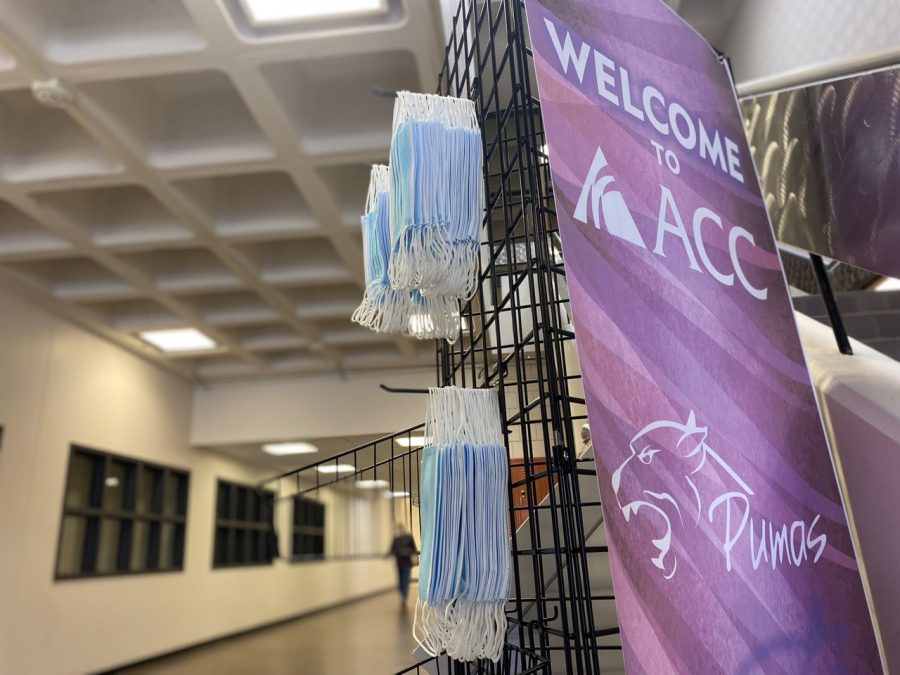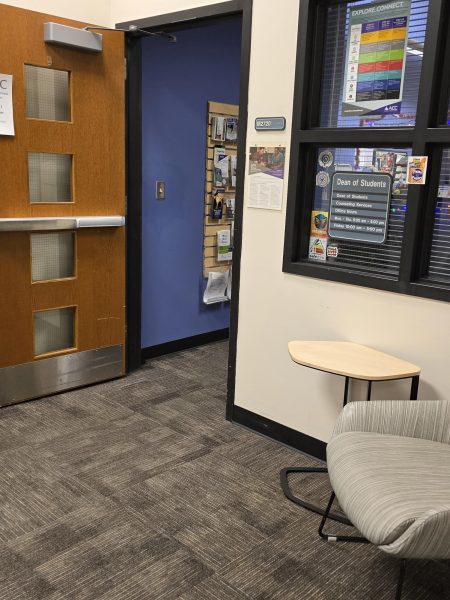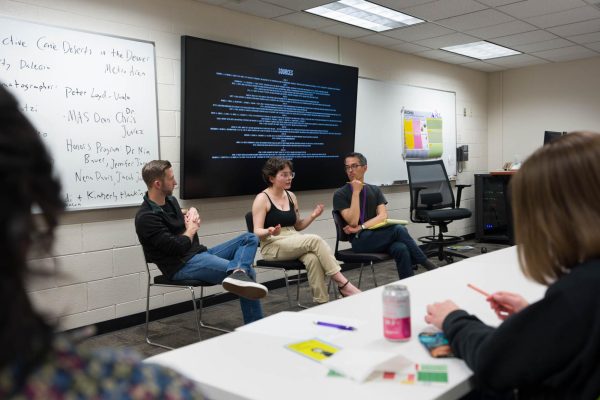ACC Kicks the Spring Semester Off with Quarantine: What Happened?
Image via Angela Merlano
Masks displayed near an entrance at Arapahoe Community College. Taken Tuesday, Feburary 8th, 2022.
Several restrictions and mandates are constantly updated due to the Omicron variant. Included was an unexpected quarantine for students at Arapahoe Community College (ACC) at the start of the 2022 spring semester.
Javon Brame, dean of students at ACC, is no stranger to changing requirements and mandates. He says that the administration’s main concern was preventing an outbreak of the novel Omicron variant.
“There was a surge of the Omicron variant taking place,” Brame said. ACC was apprehensive to take chances. This is associated with weak responses to new testing protocols and frequent travel.
“People are traveling internationally, and then they’re coming back… So we were practicing a certain level of care.”
It wasn’t only students who were a concern, but also faculty. Brame says administration was “worried about not being able to staff the campus at an adequate level.”
ACC is continuing to require masks on campus. Statewide mandates are changing by the end of this week to reduce masking policies. Yet, authorities suggest that schools consider keeping mask requirements on their campuses. In part because masks slow the spread of the virus.
“Our whole goal is that we really want to remain in person,” Brame said. “That’s why we’re keeping our mask requirements in place. If things continue to get better… We want to be in a place where people don’t have to wear a mask.”
New testing protocols are in place for those who are unvaccinated. ACC is requiring that students are tested frequently to ensure safety on campus. “Everyone is subject to that testing protocol,” Brame says. “The current [way] out of [the] testing protocols is to be fully vaccinated.”
ACC follows the Centers for Disease Control and Prevention (CDC) vaccination guidelines. The CDC considers individuals as fully vaccinated two weeks after their second dose in a two-dose series, or two weeks after a single-dose vaccine.
With boosters, authorities recommend that students receive a booster shot at least five months after the two series in a double-dose. A single-dose requires a two month wait after the first shot. The Pfizer-BioNTech vaccine is available to those over 12 years of age. Moderna and Janssen vaccines are recommended for adults 18 years of age and older.
ACC follows quarantine guidelines given by the CDC. It is recommended that regardless of exposure type or vaccination status, individuals should wear a mask for 10 days around others and test on day five. If symptoms develop, it is best for the individual to test and stay home.
The dean recognizes that students are frustrated with these continuously updating protocols, even if they are in the interest of student health.
“We have some students that are pleased… and we have some students that are not so pleased,” he says. But Brame relates this with the general rate of dissatisfaction with the pandemic with our population as a whole.
“Institutions of higher education are like a… society,” Brame said. “Just like some people are happy with the public health orders… [others] are unhappy with the public health orders.” He mentions that there will always be certain levels of disagreement within communities. In this particular case, it is the ACC community, and the inconvenience of unpredictability.
“I feel like every time we try to make a prediction about the COVID-19 global health pandemic, there’s something new that comes along and kind of surprises us,” he says. “There are people who have been studying virology, there are epidemiologists… and they have been shocked. They are not able to make new predictions.”
Javon Brame knows this is a difficult time for students. Despite already handling academic responsibility, they also must handle public health responsibility. Brame is open to questions, concerns, or any other comments regarding the pandemic and ACC’s proactive guidelines.
Despite going into the unknown on the administrative side, Javon Brame is optimistic about the future of ACC.
“I do not have the expertise or the knowledge to know what’s coming next,” Brame said. “But my hope is that we will learn to live with the virus and potentially develop pharmaceutical and medical advancements that help us with the virus.”
For more information on COVID-19 guidelines and protocols, visit the official CDC website or ACC’s information page on COVID-19.

Angela Merlano is a student at Arapahoe Community College who is currently earning her Associate's in Journalism. As the daughter of two Colombian immigrants, she was encouraged to excel at the English language, and her passion for...








